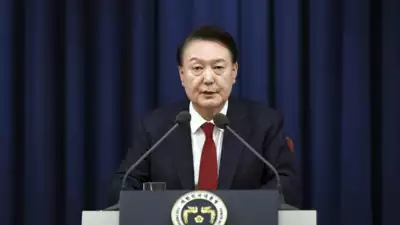
Reach the right people at the right time with Nationnewslead. Try and advertise any kind of your business to users online today. Kindly contact us for your advert or publication @ Nationnewslead@gmail.com Call or Whatsapp: 08168544205, 07055577376, 09122592273

In South Korea, tensions have risen as protests demand the resignation of the president after his declaration of martial law.
While martial law is often associated with extreme measures, it remains a topic that many do not fully understand.

According to Military.com, here are 10 interesting facts about martial law:
- Martial Law Isn’t Clearly Defined
While martial law is commonly invoked in times of crisis, its definition can vary across different countries. It generally refers to a situation in which military forces take over governance, either partially or entirely, and suspend civilian legal rights and the normal functioning of courts. However, each country may interpret it differently depending on its legal and political systems.
- It Goes Beyond Military Assistance in Emergencies
Many people think martial law is simply the deployment of military forces to assist in emergencies, but it often goes much further. In practice, martial law involves the military assuming control over law enforcement, potentially curbing civil liberties, suspending the constitution, and overriding civilian rule. It’s a drastic measure usually reserved for extreme circumstances like war or large-scale unrest.
- Who Can Declare Martial Law?
The power to declare martial law typically rests with the head of state or government. In some cases, such as during a rebellion or insurrection, it might be declared by military authorities. Different nations have their procedures for invoking martial law, which may involve government orders or, in some cases, military action on its initiative.
- Historical Precedents Around the World
Throughout history, many countries have imposed martial law in response to civil unrest or foreign invasion. For example, martial law was declared in Poland in 1981 in response to political and social turmoil, and more recently, in Thailand during times of political instability. Each instance of martial law has its unique context, but the common theme is that it marks a shift from civilian to military rule.
- Martial Law can be Imposed in Phases
Martial law doesn’t always mean an immediate, complete takeover by the military. Some countries impose martial law gradually, starting with military assistance to civilian authorities and escalating if the situation deteriorates. The level of control exercised by the military can vary, with some nations focusing on stabilizing security while others take over more aspects of governance.
- Legal and Constitutional Challenges
Martial law can raise significant legal challenges. In many countries, courts or the public may contest the imposition of martial law, arguing that it violates constitutional rights. For instance, in the Philippines, martial law was declared during the rule of Ferdinand Marcos in the 1970s, but it faced widespread criticism for human rights abuses, leading to a legal pushback.
- Martial Law and Its Legal Framework
Martial law is usually supported by existing legal frameworks within each country, such as emergency powers, state of emergency declarations, or military regulations. These frameworks determine the scope and duration of military control and provide a legal basis for suspending certain rights. However, the legality of martial law is often subject to judicial review, and it may be challenged in courts.
- The Role of the Military in Law Enforcement
When martial law is declared, the military often takes over law enforcement duties, replacing or supplementing civilian police forces. This can lead to widespread arrests, curfews, and restrictions on movement, depending on the severity of the situation. While military forces are trained for combat, their involvement in civilian law enforcement raises concerns about potential abuses of power.
- Martial Law and Public Opinion
The imposition of martial law can lead to divided public opinion. In some instances, it may be seen as a necessary response to national crises, while in others, it may be perceived as an authoritarian move. The perception of martial law often depends on the actions taken by the military and government during its implementation, especially regarding the protection of human rights and the maintenance of order.
- The National Guard and Local Military Forces
In many countries, the National Guard or local military units play a crucial role when martial law is declared. These forces can be activated by the central government to assist in maintaining order, but their deployment may vary depending on local laws and the specific needs of the crisis. Their role often involves supporting police forces, managing crowd control, or securing key infrastructure.
ALSO READ FROM NIGERIAN TRIBUNE
South Korea: Opposition seeks president’s impeachment following martial law declaration
Reach the right people at the right time with Nationnewslead. Try and advertise any kind of your business to users online today. Kindly contact us for your advert or publication @ Nationnewslead@gmail.com Call or Whatsapp: 08168544205, 07055577376, 09122592273








